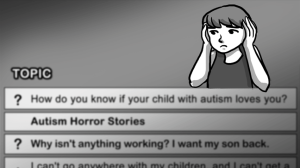
A teen looks down at their cell phone while standing outdoors, with other people out of focus behind them.
If you want to do a quick social experiment, ask your friends if it’s wrong for adults to have sex with minors. I’m betting most of them will say yes. Now ask them if what David Bowie did, in having sex with a fifteen-year-old fan, was wrong. If your social circle is anything like mine, you might get some different answers.
Taking sexual advantage of a minor is typically considered one of the most loathsome things a person can do in Western culture. But as with most sexual crimes, people’s opinions start to shift when the situation doesn’t match the “perfect victim” ideal.
If the minor is a teenager, rather than a pre-pubescent child; if the teenager gave verbal consent; if the perpetrator is someone we really, really like and admire. Any of these can shift people from “No, that’s horrible!” to “Wellll, maybe it’s not that big of a deal.”
In the David Bowie case, one complicating factor was that the teenager in question – now an adult – didn’t feel like she was harmed by the experience, and in fact seems pleased and proud about it. For a couple of weeks after Bowie’s death (and the subsequent resurfacing of this story), my social media feed was a tug-of-war between “She was fine, so what Bowie did was fine!” and “Statutory rape is always wrong; she’s a victim whether she knows it or not!”
I don’t think either viewpoint is entirely correct.
It’s not okay to insist that someone identify as a victim, or to tell them that they must have been harmed by something if that’s not their experience. I, myself, have some friends who had sexual experiences with adults while they were still teenagers, and don’t feel that it was damaging to them. A person’s lived experience is always valid.
However, just because not every teenager is harmed by statutory rape doesn’t mean that it’s an okay thing to do. Most of us know people who have driven while drunk, and gotten home safely without hurting themselves or anyone. Does that make drunk driving okay?
Of course it doesn’t.
Because the question isn’t “Is this always and in every case harmful?” The question is “Does this have a high probability of hurting someone else?” And with statutory rape, as with drunk driving, the answer is yes.
Sex with adults can be incredibly harmful to teens. The power imbalance caused by age means that the teen is much more likely to feel pressured to have sex that they don’t really want or are unsure about. This coercion can lead to all the harmful effects of any sexual violence: depression, low self-esteem, PTSD, and suicidal thoughts. Young teens who have sex with older people are also more likely to experience STIs, unintended pregnancies, and substance abuse later in life.
Given these risks, how can people justify adults having sex with teenagers?
And yet, they do. Here are some ways how – and why it’s still not okay.
1. ‘But the Teenager Initiated It’
From Lolita to “Don’t Stand So Close to Me,” Western culture has lots of media about teenage girls pursuing adults for sex. These are usually from the adult’s perspective and describe the teen as a dangerous temptress, dangling her sexuality in front of the older man.
Of course, if you actually read Lolita, you’ll see that it presents a far more realistic scenario: The adult man has chosen and groomed his target, and he takes advantage of her crush on him to push her into a sexual relationship she isn’t ready for.
Look, I had crushes on adults when I was a young teenager, too. I daydreamed about being swept away by Harrison Ford or Pierce Brosnan. And if one of my adult crushes had come around and shown interest in me as a teenager, I would have been dazzled and thrilled and extremely vulnerable.
But just because it would have been exciting doesn’t mean it would have been good for me.
Even in the rarer cases where the teenager truly does initiate things, that doesn’t mean the adult should pursue it – because it still isn’t quite the same as two (or more) adults consenting to sex. And that’s because adolescent brains are different from adult brains – which is why we have age-of-consent laws in the first place.
Starting in early adolescence, the risk-taking and sensation-seeking parts of our brains really kick into gear for most teens. This is an important part of our development into independent adults who will help shape the world. Unfortunately, the ability to think through long-term consequences and deny our impulses when we know they’re a bad idea takes a while to catch up. In fact, most people’s brains don’t fully develop with these skills until our mid-20s.
This makes for several years when teens are vulnerable to making decisions that feel sensible, but might, in reality, be really, really bad for them.
Adults in teens’ lives need to help them learn to make choices that are healthy for them. Making a teen’s decisions for them isn’t helpful, but neither is going along with whatever the teen thinks is a good idea at the time.
When it comes to sex, teens need adults who will give them appropriate information and freedom to explore their sexuality in healthy ways, always centering the teen’s needs. Having sex with that teen is not the way to do this – even if they say that’s what they want.
2. ‘The Teenager Is Very Mature, Though – Age Is Just a Number’
I have a friend who’s brilliant, and has been from a very young age. As a teenager, she could talk philosophy, she was reading college or graduate-level books, and she had a lot of emotional intelligence and insight, both for herself and for others she knew. In all these ways, she was a very mature teenager.
She was exactly the kind of person many people point to when they say, “I agree that most of the time adults shouldn’t be having sex with teens, but this teenager is so mature, she’s basically an adult already!”
And yet this friend of mine, with all her wisdom and self-knowledge, was deeply harmed by many of her teenage sexual experiences.
We talk about “maturity” as though it’s a single concept, but in reality there are so many different types of maturity. Maturity can include lots of different skills: coping with powerful emotions, reasoning through ideas, understanding how others see us, being in touch with our sexual needs, and more. Most people improve in these skills as they grow, but not all at once and not at the same rate.
Adults often make the mistake of looking at a teenager’s skills in one area and judging their whole “maturity” level based on that. Unable to contain an emotional outburst? We judge them as immature, and treat them like a child that needs to be managed. Skilled at reading and responding to complex social situations? We judge them as mature, and treat them like an adult who can bear a full burden of decision-making and self-protection.
Once again, what teenagers actually need is adults who will help them navigate the complications of having a brain that is leaping ahead in some areas and standing still in others.
What they don’t need is adults who use their advanced skills in one area as an excuse to saddle them with the burdens of adulthood – including the burden of protecting their own sexual wellbeing in a relationship of unequal power.
3. ‘The Teenager Is Sexually Active Already’
Another reason people often say “Well, it’s okay in this case” is when the teen is already sexually active, or shows a lot of interest in sex and sexuality.
Boys and masculine-presenting teens are often assumed to be sexually voracious regardless of their history, while girls and feminine-presenting teens only fall into this category if they have multiple sexual partners or typically act and dress in sexually charged ways.
Whether it’s because of gender or behavior, there is a strong tendency to consider some teens as already sexualized, and to be much less concerned about adults having sex with them than with those we consider “innocent.”
This reaction, while common, suggests that what we’re worried about is preserving the mythical idea of purity, rather than defending every adolescent’s right to own and discover their own sexuality without the interference of an adult’s lust and desires.
The number of sexual partners a teen has previously had doesn’t change the power imbalance of a teen/adult relationship, nor does it remove the adult’s responsibility to put the teen’s needs above their own desires.
A person’s sexual history and behavior is not consent. A teen’s sexual history and behavior does not magically make it okay to commit statutory rape.
4. ‘The Adult Isn’t a Bad Person’
Let’s take a second to acknowledge that rape is a scary word. It is emotionally charged in a way that few words are, apart from actual curse words. In most people’s minds, rape is a forceful and violent crime, and rapists are evil and monstrous.
The truth is, though, that violence isn’t always overt and physical, and good people can commit rape. It is very possible to violate someone’s consent without actually intending to do them harm.
Let’s go back to the car analogy. If you were walking down the sidewalk and a car swerved wildly and hit you, you are just as injured no matter what kind of person the driver is, or why they swerved.
Maybe they were drunk. Maybe they were deliberately trying to hit you. Maybe they had a sudden blackout. Knowing which one it is will probably have an emotional impact, but even if the driver is a kindergarten teacher who adopts stray puppies and unfortunately fell asleep at the wheel, you’re still in the hospital with a long recovery road ahead of you.
Similarly, when a person is sexually violated, that causes damage whether the person who did it is a nice person or a jerk. It causes damage whether the other person was being careless, was intoxicated, or was being deliberately malicious.
Sometimes good people do bad things – especially in a culture that gives us lots of justifications and excuses.
When the David Bowie case was all over the news, everybody wanted to discuss it in terms of whether he was a good or bad person. That’s the wrong question. The right question is, “Is having sex with a fifteen-year-old a good thing for an adult to do?”
And the answer to that is always no. No matter how nice a person they are or how good their intentions are, they are risking tremendous harm to a vulnerable person, and that’s not okay.
5. ‘But Isn’t It Ageist to Say That Teens Can’t Consent?’
Many of the above arguments could be used to claim that teens cannot consent to sex at all. If their brains are prone to making risky decisions, and if teen sexuality is really such a vulnerable thing, then shouldn’t we insist that teens abstain from sex with their peers as well as with adults?
Or, on the flip side, people may argue that it’s ageist to say teens can’t consent to sex, and that the age of their partner shouldn’t matter as long as the teen is consenting.
I agree that teens can and do have consensual sex. I also agree, as I said at the beginning, that sometimes a teenager has sex with an adult and isn’t harmed at all. However, an adult having sex with a teen is still making, at best, a negligent and irresponsible choice.
When an adult has sex with a teen, they’re not doing it out of a selfless desire to help that teen and meet their developmental needs. They’re doing it because they’re aroused and want to receive pleasure. In the midst of those feelings, they are the last person who’s capable of making an unbiased judgement about whether this is healthy or unhealthy for the young person.
But respecting teenagers and avoiding ageism doesn’t mean treating them exactly like adults. Fighting oppression isn’t about pretending differences between people don’t exist. It’s about recognizing the power dynamics that affect people, and working to achieve justice despite these power dynamics.
Adults in our society have power over children and teenagers. And we are responsible for using that power to help and nurture them, not to gratify ourselves at their expense.
***
When we say that adults shouldn’t have sex with teenagers, we’re not saying that every teen who’s experienced this is damaged, or that every adult is evil.
Instead, we’re saying that we adults need to hold each other accountable for protecting teenagers instead of exploiting them.
We need to take seriously the harm that statutory rape can cause teenagers, even in cases that don’t match the “perfect victim” paradigm. And we need to stop giving some people a free pass just because we like them, or because it turned out okay in their case.
When we do that, it enables other adults to justify pursuing teens for sex. And even if not all of those teens are harmed, some of them will be.
Above all, we need to get much, much better as a culture in helping our adolescents explore sexuality on their own terms, in ways that meet their needs and not ours.
[do_widget id=’text-101′]
Ginny Brown is a Contributing Writer for Everyday Feminism, as well as a speaker and educator specializing in sexuality and relationships. She writes for various publications and has her own blog here. She lives in the Philadelphia area with her poly family and three cats. Follow her on Twitter @lirelyn.
Search our 3000+ articles!
Read our articles about:
Our online racial justice training
Used by hundreds of universities, non-profits, and businesses.
Click to learn more
Most Read Articles
- « Previous
- 1
- …
- 30
- 31
- 32



















